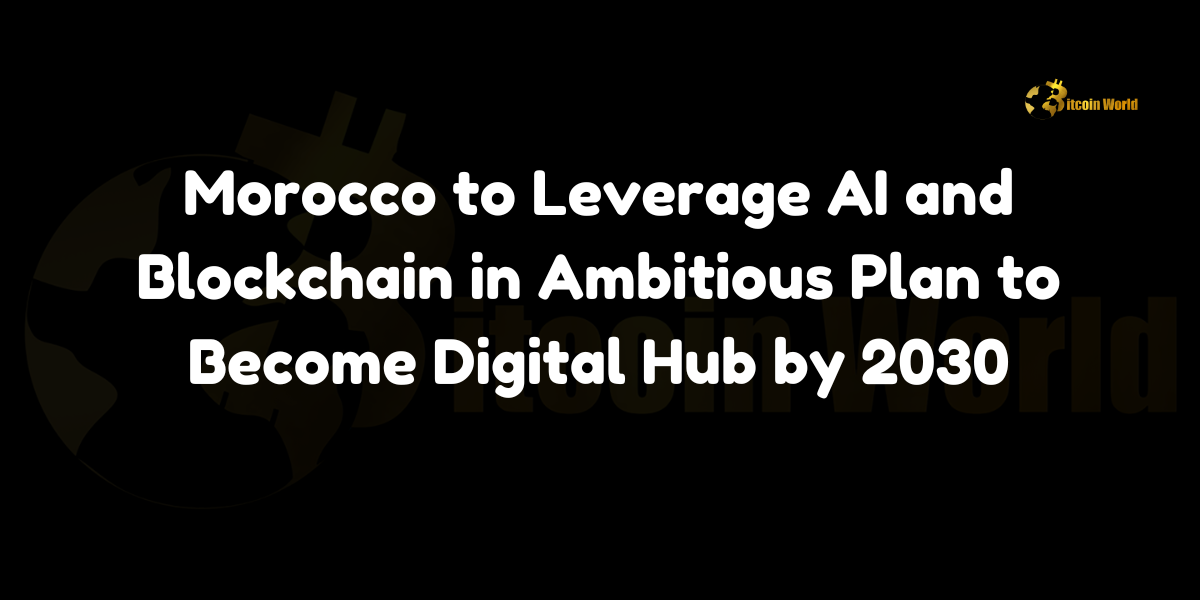Morocco to Leverage AI and Blockchain in Ambitious Plan to Become Digital Hub by 2030
In a strategic move to transform into a major player in the global digital economy, the Moroccan government has announced plans to integrate artificial intelligence (AI) and blockchain technologies as part of its Digital Morocco 2030 strategy. According to a report by CryptoSlate, the initiative is backed by a $1.1 billion budget and aims to position Morocco as a leading digital hub by the end of the decade.
The strategy outlines several key objectives, including enhancing public services, fostering economic growth, and creating 240,000 new jobs in the digital sector by 2030. By leveraging cutting-edge technologies such as AI and blockchain, Morocco aims to revolutionize various sectors, including government services, healthcare, finance, and education, while also supporting the development of AI and blockchain-based startups.
Digital Morocco 2030: A Strategic Vision for the Future
The Digital Morocco 2030 strategy is an ambitious plan that seeks to modernize Morocco’s digital infrastructure and make the country a key player in the global tech ecosystem. With a substantial budget of $1.1 billion, the strategy focuses on integrating AI and blockchain technologies into both the public and private sectors.
The key goals of the strategy include:
- Improving public services by utilizing AI and blockchain to create more efficient, transparent, and accessible government services.
- Boosting economic growth by investing in digital technologies that can enhance productivity and open up new opportunities for innovation.
- Creating 240,000 new jobs in the digital sector, including roles in AI development, blockchain engineering, cybersecurity, and data analytics.
AI and Blockchain: The Cornerstones of Digital Transformation
The integration of AI and blockchain is at the heart of Morocco’s vision to become a digital hub. These two technologies are seen as critical enablers of innovation, offering the potential to revolutionize industries by improving efficiency, security, and decision-making.
Artificial intelligence (AI) will play a pivotal role in transforming various sectors, including healthcare, where AI-driven tools can improve diagnostics and treatment planning, and education, where AI can personalize learning experiences for students. Additionally, AI-powered systems can streamline public administration, making government services more responsive and efficient.
Meanwhile, blockchain technology is set to enhance security and transparency in sectors such as finance, where blockchain can be used to create decentralized platforms for banking, payments, and asset management. The Moroccan government is also looking at blockchain-based solutions to improve the traceability and integrity of supply chains, particularly in industries like agriculture and manufacturing.
Supporting AI and Blockchain Startups
A key component of the Digital Morocco 2030 strategy is the development of a vibrant ecosystem of AI and blockchain startups. The government plans to provide support for innovation hubs, incubators, and accelerators to nurture the growth of tech startups in the country.
By fostering an environment that encourages entrepreneurship and innovation, Morocco aims to become a destination of choice for tech talent and investors from around the world. The strategy will also focus on talent development, offering specialized programs in AI, blockchain, and data science to ensure that Moroccan professionals are equipped with the skills needed to thrive in the digital economy.
Reforming Public Services with AI and Blockchain
One of the most transformative aspects of the Digital Morocco 2030 strategy is the plan to reform government services using AI and blockchain. These technologies are expected to bring about significant improvements in how public services are delivered, making them more efficient, transparent, and user-friendly.
For instance, AI-driven systems can automate many bureaucratic processes, reducing wait times for services and improving overall efficiency. Blockchain technology can be employed to secure government records, ensuring that data such as citizenship documents, land registries, and medical records are stored securely and tamper-proof.
This transformation will also extend to public procurement, where blockchain can be used to ensure transparency and prevent corruption by enabling the government to track every stage of the procurement process in a secure and immutable way.
Economic Impact: Creating Jobs and Fostering Growth
The Digital Morocco 2030 strategy is expected to have a significant impact on the Moroccan economy, creating 240,000 jobs in the digital sector by 2030. The strategy will prioritize the development of high-skilled jobs in areas such as AI development, blockchain engineering, data analysis, and cybersecurity.
In addition to job creation, the strategy will help Morocco strengthen its position as a competitive destination for foreign investment in the tech sector. By building a digital-first economy, Morocco can attract international companies and tech startups looking to expand their presence in the Middle East and North Africa (MENA) region.
Conclusion: Morocco’s Path to Becoming a Digital Hub by 2030
The Digital Morocco 2030 strategy represents a bold vision for Morocco’s future as a leader in the digital economy. By leveraging AI and blockchain technologies, the country aims to become a global digital hub, transforming its public services, boosting economic growth, and creating new opportunities in the digital sector.
With strong government backing, a $1.1 billion budget, and a clear roadmap for the integration of cutting-edge technologies, Morocco is poised to achieve its digital transformation goals by 2030. As the country continues to embrace AI and blockchain, it is likely to play a significant role in shaping the future of the tech industry in the MENA region and beyond.
Internal Link Reference
For more insights, explore our article on digital transformation trends, where we cover the latest developments in technology adoption across the globe.
Disclaimer: The information provided is not trading advice, Bitcoinworld.co.in holds no liability for any investments made based on the information provided on this page. We strongly recommend independent research and/or consultation with a qualified professional before making any investment decisions.




